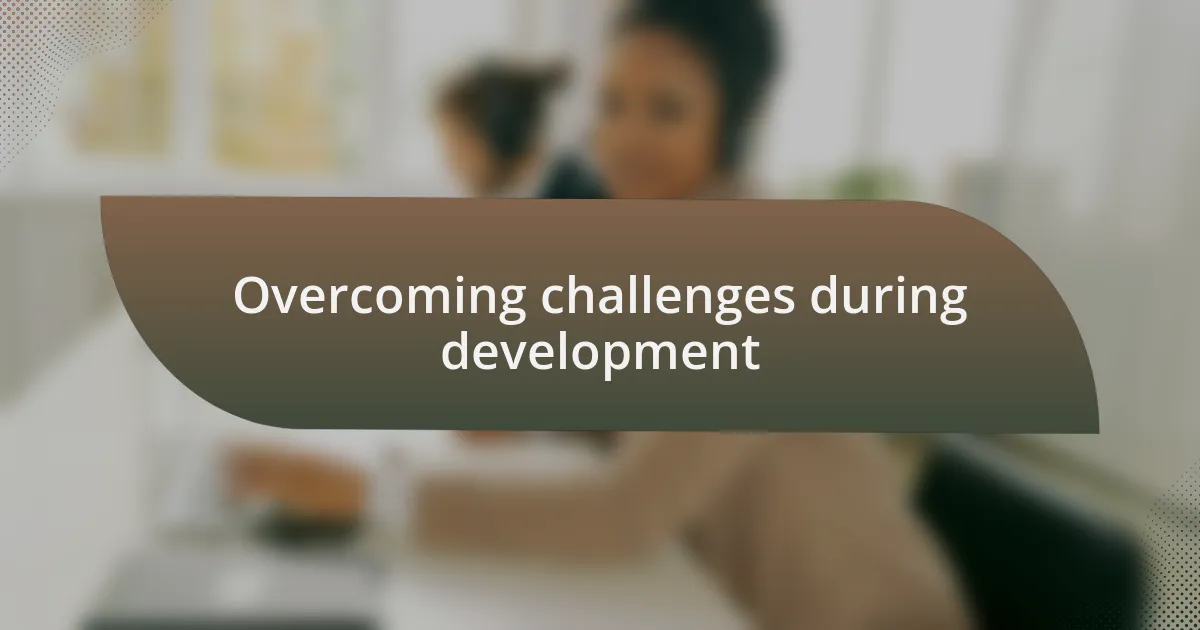Key takeaways:
- Understanding software development is crucial for enhancing productivity and solving real-world problems.
- Practical experiences, like battling implementation errors, significantly deepen knowledge and foster essential skills such as problem-solving and collaboration.
- Feedback from users is invaluable for improving project outcomes and requires an open mindset towards constructive criticism.
- Embracing iteration and thorough documentation enhances the quality and evolution of software projects.

Understanding software development importance
Understanding the importance of software development is fundamental in today’s tech-driven world. I remember when I first realized how critical it is; I was working on a project that aimed to automate tedious manual tasks. The efficiency it brought not only saved time but also eliminated errors, illustrating how software can transform entire workflows.
Have you ever pondered why some businesses thrive while others struggle? Often, it boils down to their ability to embrace innovative software solutions. In my experience, the right software can empower teams, enhance productivity, and lead to remarkable growth. I’ve seen companies turn around simply by investing in custom applications that cater to their unique needs.
It’s fascinating how software development shapes our daily lives, from the apps on our phones to the systems behind our favorite websites. I still recall the exhilaration of debugging a particularly challenging piece of code; it was a moment of triumph that underscored the value of persistence. This journey teaches us that software is more than just lines of code; it’s a powerful tool that drives progress and solves real-world problems.

Learning from practical experiences
When I embarked on my Java projects, I quickly realized that theoretical knowledge is just the beginning. I still remember sitting in front of my computer, battling with an implementation error for hours. It was frustrating, yet that moment of struggle ultimately led to a deeper understanding of Java’s intricacies and the importance of error handling. How often do we find ourselves learning best when things don’t go as planned?
In one project, I decided to build a simple web application. As I worked through user authentication and database interactions, I encountered several roadblocks that forced me to seek solutions beyond textbooks. I found myself exploring online forums, where seasoned developers shared their insights, and this collaboration sparked new ideas. Isn’t it intriguing how practical experiences can open doors to new networks and perspectives?
Reflecting on my journey, I recognize that practical experience is a teacher like no other. One of my biggest takeaways was learning the importance of version control while collaborating with a team. The initial chaos of merging different codebases was daunting, but it illuminated the value of communication and teamwork in software development. Have you ever experienced that moment of clarity when a practical hurdle turns into a lesson for the future?

Java projects overview and goals
Java projects have provided me with a diverse canvas to stretch my skills and insight. I vividly recall embarking on a data management application, where my goal was not just to write functional code but to create a user-friendly experience. It was eye-opening to realize how deeply user interface design affects user engagement, challenging me to think beyond mere functionality and to consider aesthetics and usability.
One project that stands out involved developing a game using JavaFX. The objective was straightforward: design an interactive platform that would captivate users. However, during testing, I noticed that some features fell flat and didn’t resonate with players. This led me to delve into user feedback, ultimately reshaping my approach and teaching me that understanding the end-user is crucial for success. How often do we rely solely on our assumptions without truly stepping into the shoes of our audience?
Setting measurable goals for each project also helped guide my progress and kept me motivated. With each challenge I faced, such as optimizing performance or implementing complex algorithms, I learned to celebrate small victories, reinforcing my confidence along the way. Have you ever set a goal only to find that the journey itself teaches you more than the destination? This realization has been a pivotal part of my software development career, shaping how I approach new projects.

Key skills acquired from projects
Working on my Java projects has refined my problem-solving abilities immensely. I recall one instance when I was debugging a particularly stubborn piece of code that refused to cooperate. After hours of frustration, I learned the importance of taking a step back and looking at the problem from different angles. This experience taught me that patience and a fresh perspective can often lead to the solution lurking just out of sight.
Additionally, my exposure to collaboration within project teams has significantly enhanced my communication skills. I remember a group project where we had to merge our individual components into a cohesive product. Navigating differing opinions and integrating each person’s work required clear discussions and compromise. Have you ever experienced the challenge of aligning different visions while maintaining a singular goal? It underscored the necessity of being articulate and receptive, shaping my approach to teamwork in future endeavors.
Moreover, I gained a deeper understanding of agile methodologies while working on a time-sensitive project. Adapting quickly to feedback and maintaining flexibility became essential as our project scope evolved. I found it invigorating to iterate on designs and deliver incremental updates. The thrill of seeing immediate improvement based on user feedback reinforced the value of responsiveness in software development. How often do we overlook the benefits of iteration in favor of a complete final product? That’s a lesson I carry with me in every new challenge I face.

Overcoming challenges during development
Navigating unexpected challenges during development often felt like journeying through uncharted territory. I remember diving headfirst into a project that presented a series of complex integration issues; it pushed my critical thinking to the limit. Have you ever felt overwhelmed by a seemingly insurmountable obstacle? It was in those moments of uncertainty that I learned to leverage online communities and forums, discovering that collaboration often extends beyond my immediate team to the broader developer ecosystem.
One specific challenge I faced involved a library dependency conflict that halted progress for days. At first, frustration bubbled beneath the surface as I wrestled with version discrepancies. Yet, persevering through the chaos led me to better understand the importance of dependency management. By documenting the resolution process, I not only fixed the issue but also created a reference for future projects. Have you ever turned a frustrating moment into a learning opportunity? That experience taught me that every hiccup can provide valuable insights when approached with the right mindset.
Lastly, I encountered a performance issue that severely impacted our application’s responsiveness. Though it felt daunting at first, I set out to analyze the codebase rigorously. It was like being a detective unraveling a mystery, where each clue brought me closer to the solution. This painstaking process deepened my appreciation for optimization techniques and taught me that sometimes the path to improvement requires digging through the weeds. How often do we remain satisfied with surface-level performance? I’ve learned that a deeper investigation can reveal opportunities for transformation that are truly game-changing.

Personal insights and lessons learned
Working on my Java projects has gifted me with an array of personal insights that continue to shape my approach to software development. One lesson that stands out is the power of simplicity; I remember a project where I opted for a more complex design pattern to demonstrate my skills. In the end, it led to confusion among the team and unnecessary delays. Have you ever tried to impress others only to realize simplicity often speaks louder? Now, I prioritize writing clean, straightforward code that everyone can easily understand and build upon.
Another key insight involved facing the inevitable debugging marathon. I vividly recall one late night spent chasing down an elusive bug in an API integration. Frustration turned to enlightenment when I learned that taking breaks often led to breakthroughs. Have you ever found clarity in moments of relaxation when the problem just wouldn’t budge? It taught me to step away from the screen, allowing my mind to reset and approach challenges with renewed clarity.
Through deploying several applications, I’ve also grasped the immense value of user feedback. I once received an unexpected response from a user who found an aspect of the interface confusing. Initially, it stung a little; after all, it was my creation. But that feedback was a catalyst for improvement. Have you ever had your work critiqued, only to realize it was a stepping stone for growth? Embracing constructive criticism has allowed me to refine my projects and better serve users’ needs.

Applying lessons to future projects
When it comes to applying lessons to future projects, I find that collaboration stands at the forefront. I recall a project where miscommunication almost led us to a dead end. After that experience, I committed to fostering open dialogue among team members, ensuring that everyone felt comfortable voicing their ideas. Have you ever noticed how a simple conversation can open doors to solutions you hadn’t considered?
Another pivotal realization I had was the importance of documentation. I often skimped on this aspect, thinking I’d remember every detail. But when revisiting older projects, I faced a maze of confusion. Now, I make it a habit to document my thought processes as I go. Wouldn’t you agree that a well-documented project can save countless hours down the line?
Lastly, I’ve learned to embrace iteration as a core principle. I remember launching a feature that I thought was perfect, only to discover it needed several tweaks after the fact. This experience taught me that no project is truly finished; instead, it’s a continuous evolution. Have you ever underestimated the power of refining your work? Adopting an iterative mindset has transformed how I approach development, allowing me to improve my creations significantly with each version.